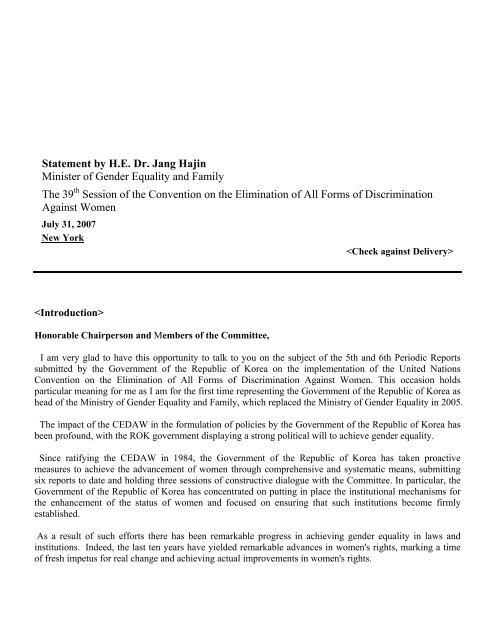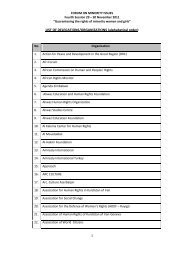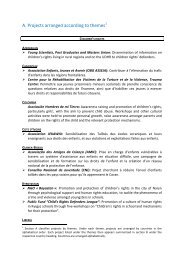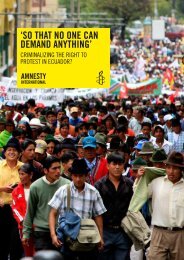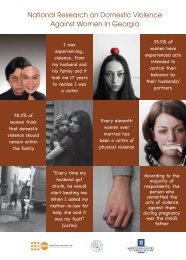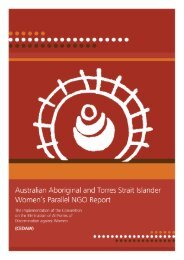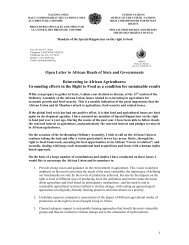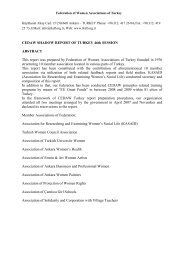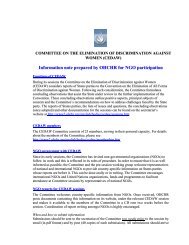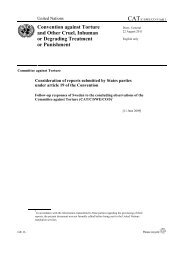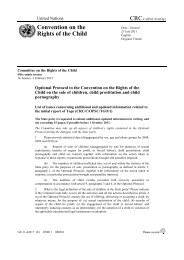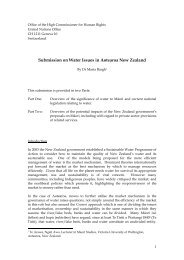Statement by H.E. Dr. Jang Hajin Minister of Gender Equality and ...
Statement by H.E. Dr. Jang Hajin Minister of Gender Equality and ...
Statement by H.E. Dr. Jang Hajin Minister of Gender Equality and ...
- No tags were found...
Create successful ePaper yourself
Turn your PDF publications into a flip-book with our unique Google optimized e-Paper software.
currently being implemented. Key elements <strong>of</strong> the Acts include stricter punishment against procurers <strong>of</strong> prostitution <strong>and</strong>providing protection <strong>and</strong> services for women victimized <strong>by</strong> prostitution.As well as implementing this legislation, in order to enhance the effectiveness <strong>of</strong> these laws the government <strong>of</strong> theRepublic <strong>of</strong> Korea launched the Comprehensive Action Plan to Prevent Prostitution in 2004. A stronger system forthe promotion <strong>of</strong> such policy has been formed, as evidenced <strong>by</strong> the launch <strong>of</strong> the Task Force under the Office <strong>of</strong> thePrime <strong>Minister</strong>, to monitor the Implementation <strong>of</strong> the Prostitution Prevention Measures <strong>and</strong> review progress made.With the Implementation <strong>of</strong> the law, punishment <strong>of</strong> sex procurers has been strengthened <strong>and</strong> the concept <strong>of</strong>victims <strong>of</strong> sex trafficking has been introduced. As a result, female victims <strong>of</strong> prostitution have been exemptedfrom punishment <strong>and</strong> their debts to sex trafficking brokers, which acted as stumbling block to the victims'rehabilitation, have been invalidated.Following the bringing into effect <strong>of</strong> the laws to prevent prostitution, initiatives to support therehabilitation <strong>of</strong> women affected <strong>by</strong> prostitution have advanced beyond the previous practices <strong>of</strong> mereprotection to a system which <strong>of</strong>fers not only counseling, but the provision <strong>of</strong> medical support, vocationaltraining, legal support <strong>and</strong> financing for women opting to start their own business. As can be seen, serviceshave been refined at all stages <strong>of</strong> rehabilitation. Moreover, through constant controls on <strong>and</strong> punishment <strong>of</strong>procurers <strong>of</strong> prostitution we are seeking to break the chain <strong>of</strong> exploitation for women in prostitution.In addition, the government <strong>of</strong> the Republic <strong>of</strong> Korea hosted three conferences for experts in thePrevention <strong>of</strong> International Human Trafficking from 2003 to 2005 <strong>and</strong> has participated in regional<strong>Minister</strong>ial-level talks <strong>and</strong> ASEM Seminars on the Prevention <strong>of</strong> Female <strong>and</strong> Child Trafficking. We areseeking to identify effective strategies <strong>and</strong> exploring measures for cooperation at the international level totackle the problem <strong>of</strong> human trafficking, a problem which is deepening both within Korea <strong>and</strong> abroad.In Korea, the past perception <strong>of</strong> violence against women as a private issue is changing. There is a growingsocial awareness that the state does in fact have a responsibility to address this important issue at the nationallevel. There also seems to be stronger recognition amongst ordinary people that prostitution is illegal, as isshown through the increase in public awareness from 30.4% to 93.2%. Moreover, judicial punishment <strong>and</strong>response to violence against women are being strengthened <strong>and</strong> the budget for victim protection has beenincreased substantially.■ Addressing Disproportionate Concentration in Women's Employment <strong>and</strong> OccupationsThe rate <strong>of</strong> participation <strong>by</strong> women in Korea in economic activities has risen from 52% in 2000 to 54.8 %in 2006. There has been an overall upward trend. However, as <strong>of</strong> 2005, Korea is still lagging behind theOECD average for the rate <strong>of</strong> participation <strong>by</strong> women in economic activities <strong>of</strong> 60.4%In Korean society, there is an increasing common underst<strong>and</strong>ing that female talent is a valuable asset forthe advancement <strong>of</strong> the national economy. The Republic <strong>of</strong> Korea is endeavoring to create jobs <strong>and</strong> promotejob security for women <strong>and</strong> to redress discrimination against female temporary workers.In 2006, the First five-year Comprehensive Plan for the Development <strong>of</strong> Women Resources <strong>and</strong> the FemaleEmployment Expansion Measures were established with various government organizations involved in theefforts to raise the level <strong>of</strong> participation <strong>of</strong> women in the workforce. Moreover, we are strengthening5
We have established the Act on Healthy Families <strong>and</strong> the Five-Year Family Policy Plan to build thefoundation for a universal <strong>and</strong> comprehensive family policy. Furthermore, we have supported initiatives forlow-income single parent households <strong>and</strong> welfare centers for single parents <strong>and</strong> children. This is to help lowincomesingle parent households <strong>and</strong> unmarried mothers who are in need <strong>of</strong> a social safety net.As part <strong>of</strong> efforts to bring about change in the male-oriented family culture <strong>and</strong> create a family-friendlysocial environment, we have developed <strong>and</strong> applied the Family Friendliness Index (FFI), an indicator tomeasure a company's operation <strong>of</strong> family-friendly programs.Recently, there has been a steep rise in international marriages in Korea. As a result, we are facing newchallenges <strong>and</strong> are seeking to come up with ways to provide support to <strong>and</strong> protect the rights <strong>of</strong> femaleimmigrants in international marriages.The government <strong>of</strong> the Republic <strong>of</strong> Korea has established the Policy for Social Integration <strong>of</strong> Familieswith Migrant Women in 2006 <strong>and</strong> has formed a Task Force, comprising representatives <strong>of</strong> 12 Ministries, tomonitor progress made. In cooperation with the International Organization for Migration (IOM), we areestablishing a system to prevent the infringement <strong>of</strong> the human rights <strong>of</strong> migrant women in internationalmarriages. We are planning to provide information <strong>and</strong> training on Korean husb<strong>and</strong>s <strong>and</strong> Korean cultureprior to the marriage, there<strong>by</strong> seeking to take active steps to prevent the infringement <strong>of</strong> the human rights<strong>of</strong> migrant women.We are providing support for the assimilation <strong>of</strong> migrant women into Korean society through supportcenters for migrant women. These centers provide comprehensive services such as Korean language training<strong>and</strong> family counseling that the women may well urgently need as they bring up their children <strong>and</strong> adjust tolife here.■ Rural WomenThe 2005 agricultural <strong>and</strong> fishery population <strong>of</strong> the Republic <strong>of</strong> Korea is <strong>of</strong> 7.5% <strong>and</strong> among them womenaccount for 53%. The government <strong>of</strong> the Republic <strong>of</strong> Korea has put in place various policies to improve thelives <strong>of</strong> <strong>and</strong> nurture skills in rural women <strong>and</strong> provide them with welfare benefits.We are pursuing welfare policies to improve rural women's quality <strong>of</strong> life such as the workload supportsystem for female agricultural workers, the expansion <strong>of</strong> the helper support system for rural households withnewborns <strong>and</strong> the expansion <strong>of</strong> women farmers' centers. Furthermore, we are fostering female farmers asagricultural specialists through tailored training to upgrade women's skills in the field <strong>of</strong> agriculturalmanagement.We are encouraging the expansion <strong>of</strong> the Rural Household Management Agreement that aims at the rationalrunning <strong>of</strong> farming households. We are also planning to revise relevant laws to formally acknowledge theoccupational status <strong>of</strong> female farmers <strong>by</strong> certifying their engagement in agricultural work. This will helpfemale farmers to take pride in being agricultural experts as well as protect women's rights as managers <strong>of</strong>agricultural businesses.7
Conclusion>Honorable Chairperson <strong>and</strong> Members <strong>of</strong> the Committee,It is with the support <strong>of</strong> the international community's support, the strong political will <strong>and</strong> commitment towomen's policies <strong>of</strong> the Government <strong>of</strong> the Republic <strong>of</strong> Korea, <strong>and</strong> the participation <strong>of</strong> NGOs <strong>and</strong>partnerships forged with them that the achievements so far have been made possible.However, despite the progress over the past decade, we need to redouble our efforts. Indeed, there are stillmany challenges ahead on the road to achieving the elimination <strong>of</strong> all forms <strong>of</strong> discrimination against women,the ultimate goal <strong>of</strong> the Convention.I look forward to a constructive <strong>and</strong> productive dialogue in the course <strong>of</strong> this review. The Delegation <strong>of</strong> theRepublic <strong>of</strong> Korea will be pleased to respond in all sincerity to any questions raised <strong>by</strong> the Committeemembers. We will readily listen to any suggestions <strong>and</strong> recommendations made in the discussions with theCommittee <strong>and</strong> take proactive steps to put those recommendations into practice.The Government <strong>of</strong> the Republic <strong>of</strong> Korea believes it is vital to promote underst<strong>and</strong>ing <strong>and</strong> awareness <strong>of</strong>the content <strong>of</strong> the CEDAW <strong>and</strong> recommendations <strong>of</strong> the Committee amongst the general public <strong>and</strong> NGOs.We have previously held a reporting session on the results <strong>of</strong> the integrated review <strong>of</strong> the 3rd <strong>and</strong> 4th Reportsin July 1998. We are committed also to holding a reporting session to raise public awareness on thisevaluation <strong>and</strong> the Committee's recommendations.I would like to bring my remarks to a close <strong>by</strong> expressing my appreciation for <strong>and</strong> paying tribute to thehard work <strong>and</strong> dedication <strong>of</strong> the members <strong>of</strong> the Committee on the Elimination <strong>of</strong> Discrimination againstWomen in their tireless efforts to achieve the global <strong>and</strong> universal enhancement <strong>of</strong> women's rights.Thank you.8


